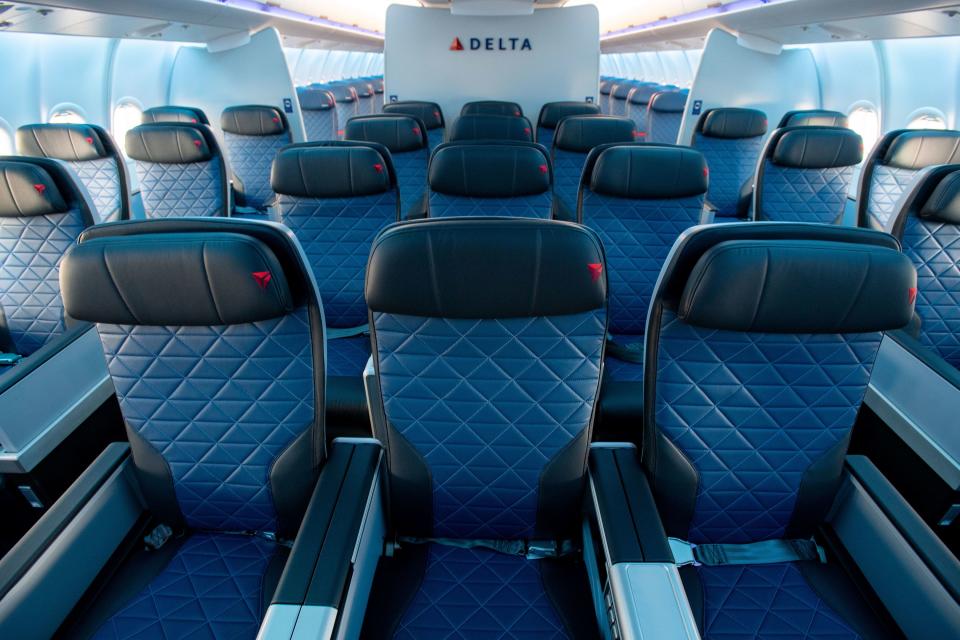Delta's CEO just sounded the alarm for airlines that depend on selling cheap tickets to survive
Delta's CEO questioned the financial viability of airlines struggling despite healthy travel demand.
Airlines desperate to generate revenue have flooded the market with cheap flights in recent months.
United's CEO had similar words for low-cost carriers in June.
Delta Air Lines CEO Ed Bastian had stark words for competing airlines that depend on selling low-priced tickets to stay alive.
"You cannot, if you are on the lower end of the industry's food chain, continue to post losses, particularly given the health of the demand set we've seen over these last couple of years," Bastian said as Delta reported disappointing second-quarter financials and warned things could get even worse.
Airlines that can't break even "will not be given the opportunity to continue to run business models they have," he added.
Bastian's comments came in response to a question about the potential for structural changes within the industry as many airlines struggle to remain profitable.
Delta's second-quarter profits fell by 29% compared to the previous year, a bigger decline than analysts had expected. Coupled with a lowered summer outlook, the results sent shares tumbling.
A big contributor to the lower profits was lower airfares and extra capacity, especially in economy class,
"Domestic industry seat growth accelerated into the summer months beyond normal demand growth," Delta president Glen Hauenstein said on the call. "This has impacted main cabin unit revenue trends through the summer."
Passenger load factor, which measures how much an average flight is filled, and yield, a measure of how much money it receives to fly a single paying passenger a mile, both fell compared to a year ago.
Oversupply is great for consumers — but hurting airlines' bottom lines
In June, the average price of a plane ticket in the US was at its lowest in 15 years, according to Labor Department data.

The oversupply of seat capacity extends beyond a single airline's bottom line. As airlines struggle to generate enough revenue, they've flooded the market with flights and cut ticket prices.
While many are beginning to reel back the excess capacity, some airlines, especially low-cost carriers, depend on selling these cheap tickets at high volumes for survival.
Southwest Airlines lost $231 million in the first quarter of 2024, while fellow low-cost carriers Spirit and Frontier lost $143 million and $26 million, respectively, during that same period.
At the same time, all three low-cost carriers have reported increases in the cost of labor, aircraft, and airport operations this year.
America's full-service legacy carriers like United and Delta, which in recent years has accounted for as much as 50% of the profits generated by the entire US airline industry, have diversified revenue streams to help absorb the hit from lower economy cabin profits.
For example, Delta can lean on credit card partners like American Express to pump $1.9 billion into its coffers during the second quarter or high-margin offerings like DeltaOne to cover lower income from economy seats.
During the second quarter, 56% of Delta's revenue came from its more expensive cabins.

Low-cost carriers don't have that benefit. Their price-sensitive customers limit their ability to raise prices. If an LCC gets too close in price to a mainline carrier, it can lose its main competitive advantage.
To succeed, according to Bastian, airlines need to understand that the definition of providing value to customers, which has traditionally been having the lowest fares, no longer rings true.
"I'm convinced across the industry is rewarding those that are providing real value, meaning a better quality experience, better value for money in terms of the product we are offering and reliability," Bastian said.
It seems America's low-cost carriers agree with Bastian's sentiments.
Both Frontier and Spirit announced in May that they're cutting several of the ancillary fees they frequently charge passengers. At the same time, Southwest executives hinted in April of potential changes to its boarding policy to help generate additional income and offer customers the option of a more premium experience.
Read the original article on Business Insider

